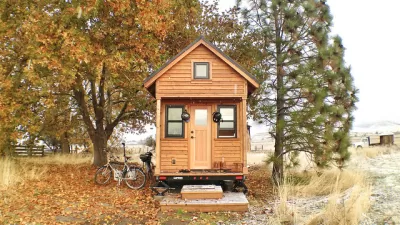Bill Rees, creator of the ecological footprint concept, warns that economic growth needs to slow down greatly if we want to maintain a civilized life on Earth.
"Bill Rees has consumer ennui."
"It isn't fair of me, really, to drop the good professor into this sprawling big-box store like a mouse in a maze. After all, he's not what you might call a retail-therapy kind of guy. In fact, few individuals on the planet have a richer understanding of precisely how $18.99 stewpots-because of the resources they consume in production and the waste they produce in their eventual disposal-are leading us toward a societal collapse. Rees has not only done the math on the true cost of our insatiable consumer appetites, he actually wrote the formula and came up with a simple metaphor-the ecological footprint-in an effort to get it through our thick skulls."
"Unfortunately, Rees's most recent finding-that humanity may be inherently unsustainable, the theme of his upcoming book-isn't earning him many friends in high places. Neither are his recommendations. In effect, he says, we need to do away with all the shopping, yesterday, and pull the emergency brake on runaway economic growth. And if we don't? 'We will trigger or disrupt something on a scale never before imagined, and take the whole system down,' he says matter-of-factly. 'It may not be the end of life on Earth, but it will make it very difficult to have civilized life.'"
"While the underlying science may be sound, these are not terribly marketable ideas. Stop growth? What are you, nuts? Yet deep down, at least a few of our policymakers and business leaders may believe Rees is correct. That said, the required whole-system changes are so profoundly unsellable that they pretty much never hit the ground."
FULL STORY: Rees's Thesis

Maui's Vacation Rental Debate Turns Ugly
Verbal attacks, misinformation campaigns and fistfights plague a high-stakes debate to convert thousands of vacation rentals into long-term housing.

Planetizen Federal Action Tracker
A weekly monitor of how Trump’s orders and actions are impacting planners and planning in America.

San Francisco Suspends Traffic Calming Amidst Record Deaths
Citing “a challenging fiscal landscape,” the city will cease the program on the heels of 42 traffic deaths, including 24 pedestrians.

Bend, Oregon Zoning Reforms Prioritize Small-Scale Housing
The city altered its zoning code to allow multi-family housing and eliminated parking mandates citywide.

Amtrak Cutting Jobs, Funding to High-Speed Rail
The agency plans to cut 10 percent of its workforce and has confirmed it will not fund new high-speed rail projects.

LA Denies Basic Services to Unhoused Residents
The city has repeatedly failed to respond to requests for trash pickup at encampment sites, and eliminated a program that provided mobile showers and toilets.
Urban Design for Planners 1: Software Tools
This six-course series explores essential urban design concepts using open source software and equips planners with the tools they need to participate fully in the urban design process.
Planning for Universal Design
Learn the tools for implementing Universal Design in planning regulations.
planning NEXT
Appalachian Highlands Housing Partners
Mpact (founded as Rail~Volution)
City of Camden Redevelopment Agency
City of Astoria
City of Portland
City of Laramie




























